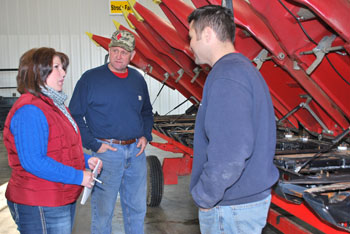50 years of helping farmers manage their business
50 years of helping farmers manage their business

Richard Strode was only a young boy in 1962, but he remembers his father meeting with the fieldman from Kentucky Farm Business Management at their farm on the river bottoms of the Ohio to discuss his hog operation. Today, he and his son, Jason, grow predominantly grain crops on the same land, and they are the second and third generations to rely on the expertise from their farm business management specialist.
“They’re important to our banker, us and our piece of mind to know where we are, where we’re going and how we’re going to get there,” Jason Strode said.
This year marks 50 years of Kentucky Farm Business Management specialists helping producers from all commodity groups get a better handle on their finances through accurate farm records.
Farmers, University of Kentucky Cooperative Extension agents and UK agricultural economists started the first program in Daviess, Henderson and Union counties after learning about a similar program in Illinois. The group recruited Melvin Gelbach, an Illinois farm business analyst, to run Kentucky’s program.
Now, four area farm management groups stretch from the Mississippi River to the foothills of the Appalachian Mountains. These groups and the UK College of Agriculture run the program. Participants and the university split the program’s costs.
Suzy Martin has been an area extension specialist in the Ohio Valley Farm Analysis Group for the past 11 years. This area includes the original three counties plus Ohio, McLean, Hancock, Webster and Hopkins counties. In her opinion, specialists providing an unbiased, third party opinion to the farmers concerning financial matters is one reason the program continues to be vital to farmers.
“I don’t want to sell them anything,” she said. “I don’t want to loan them any money. I just tell them the honest truth, which is what the numbers tell us.”
Richard Strode agrees.
“The biggest thing is having somebody to talk to besides your local banker on whether you should buy a farm or a piece of equipment,” he said. “There are not too many people you can talk to about that privately, and in tax season, it’s a big help.”
Martin meets with the Strodes and her other clients a few times a year.
“It’s (farm visit) very different with each farmer that I talk to,” she said “Some of them are very good bookkeepers and want more of the comparative analysis, information for their banker, want to talk about growth and what they’re going to do in the future. There’s a few that are still not good bookkeepers, and we spend a lot of time making sure the book is in good shape.”
Like Richard Strode, David Alexander is a second-generation member of Kentucky Farm Business Management. He was at UK studying agricultural economics when his father became one of the charter members. While at UK, Alexander got a unique look at the program as the first year’s records were discussed in class. After college, he returned to the family farm in Henderson County, and his father turned over the record book to him.
“I received a good knowledge of the record book system while in college, which made it a very easy system for me to keep my records on,” said Alexander, who raises wheat, popcorn, tobacco, cattle and an orchard. “They are very accurate, very detailed, and I always balance them to the penny.”
Both Alexander and the Strodes agree one of the best things about the program is the comparative analysis they receive at the end of the year from their specialist, which is a unique feature of this program. The analysis compares their operation to other member operations of the same size and type.
“It gives you something to compare to and lets you know some areas you need to work on,” Alexander said. “If my field costs are too high or my repair costs are too high, maybe I’m pushing my equipment too long and need to trade.”
Alexander and the Strodes said the program has been very beneficial to them and their operation. It’s a program Jason Strode plans to continue using as long as he’s farming.
“I think it’s something that’s very worthwhile,” he said. “I think it’s really good for somebody, who’s starting out, especially when working with lenders. Agriculture is such a high risk, high asset capital investment that you need to know where you stand.”
Community Development Crops Economics Extension Horticulture Livestock


